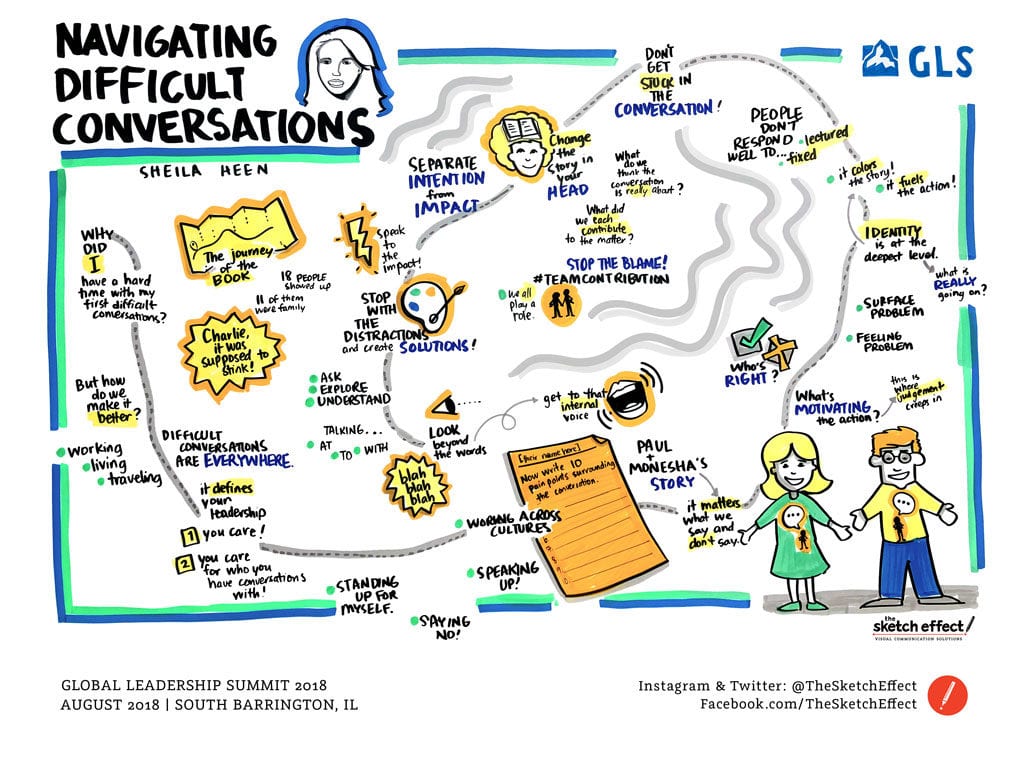Lesson 1: In this GrowthTrack, Sheila teaches you how to reframe your thinking about difficult conversations.



The first step on your learning journey is to reflect on Sheila Heen’s session and the learning you experienced at The Global Leadership Summit. People often say that attending the Summit is like drinking from a fire hose. So, as we focus on the topic of difficult conversations, let’s take this week to review the session.

Sheila Heen – Difficult Conversations – Graphic Recording
GLS18 Session Notes:

We feel like conversations are not supposed to be difficult. But every one of us has difficult conversations in our lives. Difficult conversations are a big part of leadership.
The presence of difficult conversations indicates:
We need to look beyond what people are actually saying to one another. We need to become aware of our internal voice.
In difficult conversations, our internal voices are turned up to full volume.
Drama: Monisha and Paul are discussing plans for a client meeting. Paul wants to book an expensive experience to land the client. Monisha is concerned about the budget.

In most difficult conversations, we feel like it’s our job to set the other person straight. The real issue is that they need to change. People don’t respond well to being lectured, blamed and fixed.
The other person also has an internal voice. Their internal voice is focused on what they are right about.
So what do we do?

As human beings, we need each other. Sometimes we misunderstand each other and let each other down. But we also need each other to learn from those mistakes.

Story of seminary students and a man who needed medical attention. They were told they needed to give a speech, starting in five minutes. Only 10% stopped to help the man. When the students had 20 minutes, 50% stopped.
We need to make time in our busy lives to better handle our most important relationships.
Leadership is about showing someone a better future that we will co-create together.
*Disclaimer: GLS18 Session Notes are only available in the United States*
Sheila Heen encourages us to reframe our thinking about difficult conversations. Instead of seeing difficult conversations as a win-lose battle, she says that we need to take a learning posture.
1. Thinking back on the talk, what were your top insights? In your journal, write down three phrases, concepts or insights that had the strongest impact.
2. Think about the difficult conversations you are facing right now. Pick one of these conversations as the focus for your learning in this GrowthTrack. This GrowthTrack will prepare you to engage in that conversation during the last week of your learning journey. The conversation I will be focusing on is: _____________.
3. What is working well in this conversation right now?
4. What is not working well in this conversation right now?
1. Take the “Difficult Conversations” Assessment:
Take the assessment below to get a baseline of your awareness of difficult conversations at the start of this journey. You will take this assessment again at the end of this GrowthTrack to track your growth over the next four weeks.
2. Review your responses to the assessment:
3. Calendar it! Block time in your calendar to go this course – 10 minutes per week over the next 4 weeks.
Instructions:
Take this assessment to get a baseline of your skills in difficult conversations at the start of this journey. You will take this assessment again at the end of this GrowthTrack to measure your growth. Use the scale below to score yourself. Use your journal to track your scores.
Scale:
1 – Never True of Me
2 – Rarely True of Me
3 – Sometimes True of Me
4 – Mostly True of Me
5 – Always True of Me
Assessment Questions:
1. I spend time to reflect and prepare before entering into difficult conversations.
2. When entering a difficult conversation, I work to understand the other person’s perspective.
3. When entering into a difficult conversation, I do not presume to know the intentions of the other person.
4. When entering a difficult conversation, I do not focus on who is to blame.
5. When entering into a difficult conversation, I consider the contribution that each of us made to the situation.
6. I am aware of the diverse emotions that I bring to a difficult conversation.
7. In a difficult conversation, I can discuss emotions without becoming emotional.
8. I am aware of the ways a difficult conversation triggers my identity issues.
9. I can intuit the issues that a difficult conversation might trigger in other people.
10. I am able to embrace a complex self-identity (i.e.: not all or nothing).
We welcome and encourage comments on this site. There may be some instances where comments will need to be edited or removed, such as:
If you have any questions on the commenting policy, please let us know at heretoserve@globalleadership.org
“We welcome and encourage comments on this site. There may be some instances where comments will need to be edited or removed, such as:
If you have any questions on the commenting policy, please let us know at heretoserve@globalleadership.org”
I am not sure what to make of #8. I don’t know what identity issues mean? I am secure in who Christ has made me to be. If I am misunderstanding the question please enlighten me, I am willing to learn all that I can to be all that Christ has called me to be. Thanks
Identity is the story we tell about who we are.
Am I competent?
Am I a good person?
Am I worthy of love?
Sorry, I was expecting an audio or video link? Aren’t these presentations?
Hi Beth,
Our GrowthTracks present the content from GLS18 in various formats, so yes some of the content will be video. The content for this week is an written overview with imagery.
The Global Leadership Summit
I am personally, exceptionally weak in #9. My expectation is we can discuss difficult topics and lay our personal offenses down, but this seems to rarely be the case OR my presentation is way off. My focus for learning will be this one point at this time….then, I’ll revisit and see what else pops up for my greatest weakness.
This was great, it was refreshing and encouraging on road of improvement.
Me doy cuenta que tengo un predisposición antes de cada conversación y esto dificulta mi desempeño. A demás debo mejorar mi estado emocional. Esta parte a sido de gran ayuda. Gracias.